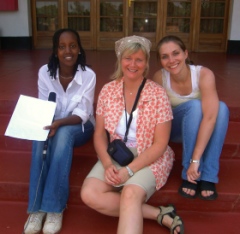Next: Faculty “frosh”
Posted Jan. 12/08

- A graduate of the School of Journalism and Communication and the Norman Paterson School of International Affairs, Kanina Holmes (centre) spent a year studying in Tanzania during her master’s program. She returned to Carleton to teach after a decade of working in the media. She seized the opportunity to teach a journalism class at the National University of Rwanda, where she is pictured with students.
When traditional media such as newspapers, television, books or radio are controlled by a government or regime, a broadcasting conglomerate with a bottom line, or a society’s definition of newsworthy, then dissenting views, alternate voices and story telling can be sidelined—but not silenced. People find other ways to tell their stories.
Citizen journalism, the catch-all term employed when the former audience becomes the publisher, broadcaster or disseminator of information, is made easier and farther reaching by the internet: blogs, social networks and video-sharing sites allow anyone with access to a computer access to an audience.
Kanina Holmes, BJ/92, MA/95, became interested in citizen journalism while she was teaching broadcast journalism in Africa. An assistant professor in the School of Journalism and Communication, she travelled to the National University of Rwanda in Butare to teach as part of the Carleton-led Rwanda Initiative in 2006. Laden with donated television equipment and laptop computers, Holmes found her students embraced the technology and were eager to tell their stories.
“For the first newscast ever produced by students at that university, the students all told stories that were socially conscious and had a social justice theme,” says Holmes. “Given everything that Rwandans have been through, I found their capacity for compassion and activism astounding.”
Holmes began pondering how people let others know they are there and have something to say. Whether at a village level or for a mass audience, how do people network and communicate? Her interest was further piqued when she supervised graduate student Andrea Hunter, MJ/07, whose thesis dealt with blogging and the communities that form as a result.
With a team from the Centre for Voluntary Sector Research and Development, Holmes hopes to get approval on a proposal for a pan-African citizen engagement initiative—a multi-year project to engage civic society—that would allow her to look at citizen journalism as a way to get people involved in politics and decision making. By looking at case studies of groups such as non-governmental organizations that are successful in engaging the media and public this way, Holmes hopes to identify the factors involved in effective citizen journalism. Using this research, she’d like to then look at how citizen journalism manifests in developing countries: how is it starting to appear and how does it differ?
Closer to home, Holmes is interested in exploring how professional journalists in North America are influenced by citizen journalism and how they mine for stories and network with sources using the same tools.
“Some segments of the population feel the media ignores them, and only focuses on the mainstream. Citizen journalism flourishes when people feel shut out,” she says. “Those who can articulate themselves well or groups with a clear message are empowered and can change media and politics through citizen journalism.”
“I hope that this project is a bridge between discovery and action,” Holmes says.